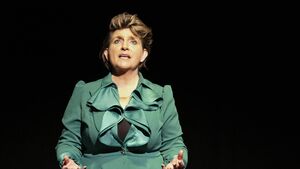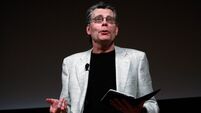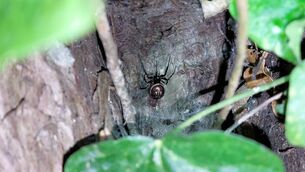Home will always be where the heart is

Morag Prunty's superb one-woman show explores the complexities of Irish identity.
“Where are you from?”
For many people, that is a very easy question to answer.
For me, I am one of those whom such a question always gives pause for thought. I am from Breaffy but I live in Achill and myself and my wife Aisling’s kids are being raised in Achill. So I am never quite sure how to answer that one.
At a macro level, I am from Mayo and Ireland but drill down deeper and it is more ambiguous. Rural Ireland being what it is, I will always be a blow-in to Achill and I’m fully accepting of that.
As time moves on too, I know fewer and fewer people growing up in Breaffy.
Breaffy played Achill in the West Mayo Kelly Cup Final earlier this year in a rare clash between the two clubs. I brought two of the kids who were bemused by the fact I was rooting for Breaffy and not Achill, their club, especially with their maternal cousin lining out for them. I’m very invested in the Achill club and have been involved in coaching in recent years. But I played with many of those Breaffy players and my involvement with the club stretches across most of my life. That tie will always be there.
Perhaps if one of my kids was playing for Achill against Breaffy, I might switch loyalties. Perhaps.
It reminded me of a wonderful piece by Frank McNally in in 2023 where he talked about the Dublin footballers Ryan and Colm Basquel. McNally used to go out with their mother, Bernie Ryan, before she met a Mayo man in their circle, Noel Basquel, whom she ended up marrying.
McNally recalls the Basquels being avid Mayo GAA fans, which is most certainly true. But their kids grew up in Dublin and in 2023 Colm scored two goals in their All-Ireland quarter-final thumping of Mayo. It shows how fluid and complicated identity can get.
“I’m sure parental pride trumps mere county loyality in such circumstances. If I were Colm’s dad, I’d have been cheering for him, primarily. Still, watching from a distance, it was like Mayo’s emigration drain in microcosm,” wrote McNally.
Such transience is a huge part of Irish life, particularly in our county.
In Achill on the August bank holiday, the second annual Féile Chorn Acla took place. It brought under 16 and under 14 Gaelic football teams from Achill with second and third generation Achill diaspora, whose roots and love of Achill remain fiercely strong.
Kids and their parents came from all over the country to take part with some grandparents in Achill able to see their grandchildren play a game for the first time.
It is a competition that evokes a certain sadness about the patterns of emigration but also highlights and gives a vehicle for the grá for home for ex-pats and helps to seal that bond.
A team captained by Conor O’Keeffe won the Brian O’Keeffe Under 16 boys final. The name is no coincidence. It is in memory of Conor’s uncle Brian, who was killed in a road accident in Kilkenny in 2008, aged just 22. Brian’s mother Mary Jo proudly presented the cup to her grandson.
Conor lives in Dublin but like so many of the Achill diaspora, the trips west are common and the link to the ancestral homestead remains strong.
I fell into chat about the All-Ireland with a man in the local bar before the Kerry v Donegal clash. With his Donegal accent, I assumed he would be all in on the Tir Conaill county. But, no, his allegiance is firmly with Mayo, the county of his mother’s birth and where he spent much of his childhood and where he returns on holidays every chance he gets.
His brother, who loves coming back to Mayo too, is, by contrast, a dyed-in-the-wool Donegal supporter. Same house, same upbringing but different identities.
It’s why some of the recent debate about who should be considered Irish and who should not is so galling.
Who are you to tell someone if they are Irish or not? Mayo or not? Do not judge by skin colour or accent. They may epitomise the values of Ireland and embrace our culture far more than those who wish to deny them such a label.
Identity is very much a feeling and how we feel is intrinsically personal.
It is hard for parents and grandparents to see their offspring leave, especially if it is a case of the opportunity to wait simply not being present.
Whatever about those of Mayo heritage who live elsewhere in the country, it is harder still for second generation Irish in the UK. They are often in an identity purgatory. In England, they are often considered Irish, while over here we think of them as English.
is a superb one-woman show by Kate Kerrigan (Morag Prunty) which aired in Achill last Wednesday night.
Born in Scotland and raised in London to Mayo parents who had to emigrate from the desolate west of Ireland of the 1960s, her Irish identity has been a lifelong battle. She spent her summers as a child in Mayo, she has lived in Mayo for 35 years, married here, and has raised children here. She is more Irish than many who have lived all their lives here. And yet her accent remains stubbornly cockney.
“If I could get rid of it, I would,” she told the packed house at Johnny Patten’s in Derreens.
She first felt like she belonged somewhere when she was in an Irish country kitchen on a summer holiday in her teens ‘until I opened my mouth to speak’.
English accents abound in Mayo, many of them second or third generation Irish who feel more at home here than they ever did in the UK. But trapped, to some extent, by their accent.
But, as Kerrigan said, Irishness is as much about culture and heritage as place of birth. And long may being Irish remain something to be proud of.





